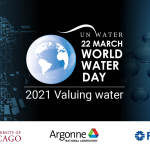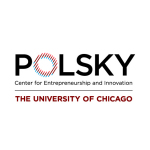Chicagoland Research Institutions Look to Transform the Water Industry

CHICAGO–(BUSINESS WIRE)–#Argonne–The Midwest is leading the nation as a hub for water innovation with state-of-the-art research facilities and world-renowned researchers at the University of Chicago, Argonne National Laboratory, and Fermi National Accelerator Laboratory (Fermilab).
On World Water Day 2021, people and organizations come together to celebrate water and raise awareness of the global water crisis – focusing on how to support achievement of Sustainable Development Goal (SDG) 6: water and sanitation for all by 2030.
“To overcome the daunting challenges we face this century in providing sufficient supplies of clean water, we will need to shift from our current once-through use of water to a paradigm of water reuse and recycling. Chicagoland research institutions are leaders in developing innovative materials and technologies to enable this new approach to water (re)use,” said Seth Darling, director of the Center for Molecular Engineering at Argonne National Laboratory and Senior Scientist at the University of Chicago’s Pritzker School of Molecular Engineering (PME).
The PME integrates science and engineering to address global challenges from the molecular level up – and is the first school in the nation dedicated to the emerging field of molecular engineering.
“This region is emerging as a nexus for water innovation both nationally and globally, from the popular Third Coast Water Seminar Series to vibrant collaborative research centers like the Advanced Materials for Energy-Water Systems (AMEWS) Energy Frontier Research Center and the Israel-US Collaborative Water-Energy Research Center (CoWERC),” added Darling, who also is the director of AMEWS.
Increasing its leadership in this space, Argonne is pioneering research, discoveries, and innovations in several areas. This includes materials discovery, synthesis, characterization, and scale-up, in addition to new process technologies for systems that sense, treat, and handle water. Argonne’s mission is to pursue water science and engineering empowered by artificial intelligence (AI).
“Argonne’s ‘Water + AI’ strategy will potentially transform the water industry by offering cost-effective and socially responsible solutions to the many challenges,” said Junhong Chen, lead water strategist at Argonne and a professor of molecular engineering at the University of Chicago’s PME.
“We will accomplish this vision through partnerships with our stakeholders, including local, state and federal government, academic and national lab collaborators, industrial partners, nonprofit organizations, and regional economic development hubs,” said Chen.
Both Argonne and Fermilab, which are U.S. Department of Energy national laboratories managed by the University of Chicago, frequently work with federal agencies, other universities, and corporations on research collaborations.
Fermilab currently is working with the Metropolitan Wastewater Reclamation District of Greater Chicago, but the progress could have benefits far beyond the local area. “Fermilab is known around the world for basic research,” said Mauricio Suarez, head of the Illinois Accelerator Research Center (IARC) at Fermilab, “And now we are using the same machines that have probed the smallest constituents of matter to help create a greener planet.”
Drawing on its decades of designing and building particle accelerators for discovery, Fermilab is developing a compact, skid-mounted accelerator that can clean polluted water. The portable machine is small enough to fit in the back of a truck and works by sending a beam of electrons through the volume of water to be treated, destroying multiple contaminants simultaneously, including dyes, pathogens, pharmaceuticals, and perfluorinated compounds, which are found in the tap water of more than 15 million Americans.
A multi-tool for treating contamination, Fermilab’s compact electron accelerator will be able to treat 200,000 gallons per day – five times more than conventional technologies – and is expected to require half the power of currently available treatment options.
“By using a particle beam to clean water, we will be able to annihilate many different types of contaminants cleanly, efficiently, and cost-effectively. Water treatment is one of the many ways that particle accelerators can have a positive impact on our health and environment,” said Suarez. “We at Fermilab are proud to be able to use our particle accelerator expertise, facilities and capabilities to help solve the problem of water contamination.”
The Polsky Center for Entrepreneurship and Innovation manages the IP portfolio for all University of Chicago innovations and technologies and works to foster collaboration between laboratory scientists, engineers, students, researchers by connecting them with one another as well as with industry partners.
About the Polsky Center for Entrepreneurship and Innovation at the University of Chicago
The Polsky Center for Entrepreneurship and Innovation applies world-class business expertise from the University of Chicago’s Booth School of Business to bring new ideas and groundbreaking science and technology innovations to market. Originally established at Chicago Booth in 1998, the Polsky Center is a multidisciplinary organization staffed with deeply experienced scientists, business executives, and talented staff responsible for driving technology commercialization through patents and licensing, new venture creation, and commercial partnerships at the University of Chicago. Through education, programming, mentorship, intellectual property and venture support, the Polsky Center provides critical resources to enable the success of entrepreneurs and the establishment and growth of new companies. Learn more at polsky.uchicago.edu.
Fill out the “Get Started with the Polsky Center” online form to access our resources and subscribe to our newsletters.
Contacts
Alexia Elejalde-Ruiz
aelejalderuiz@uchicago.edu

